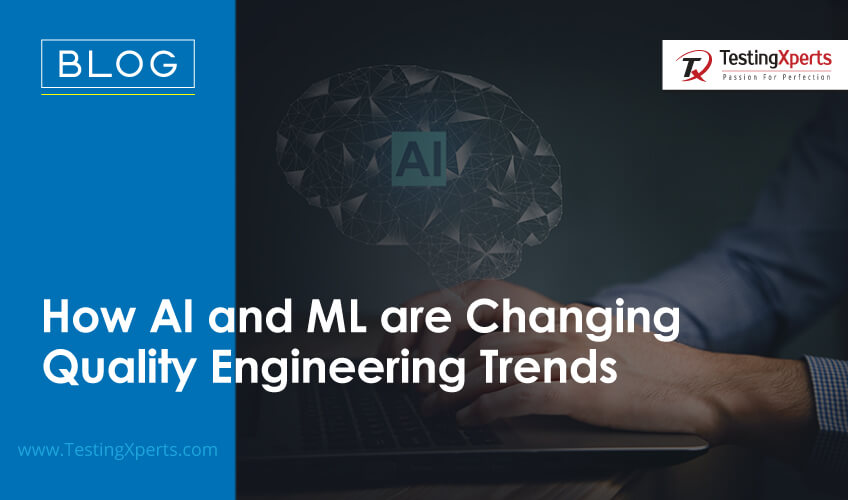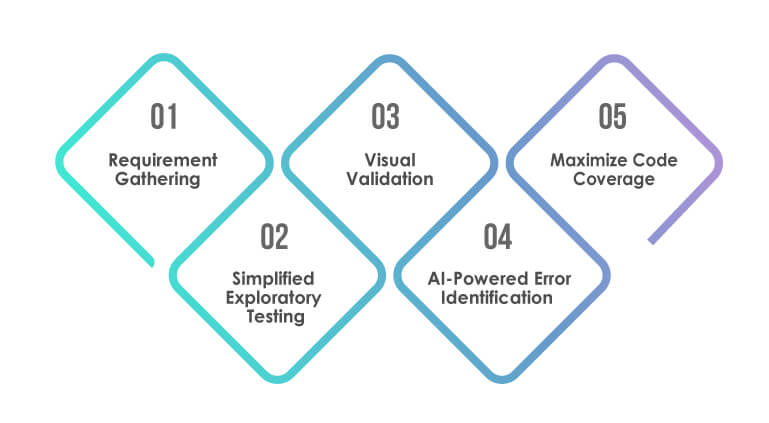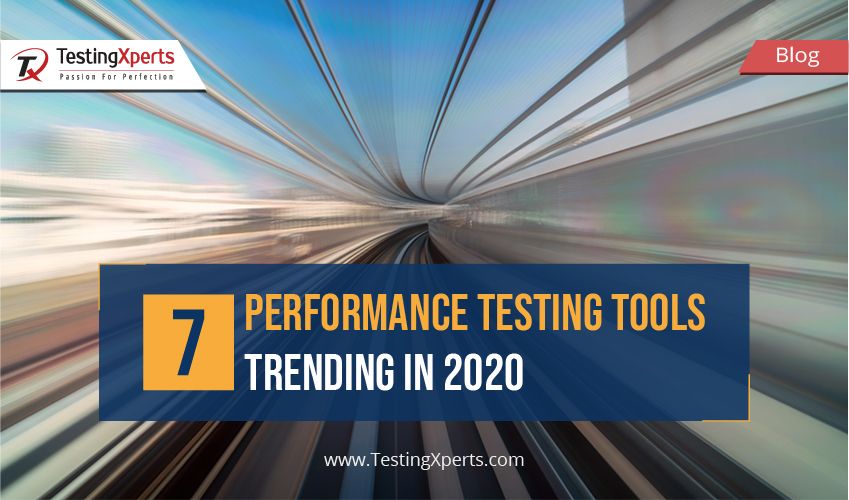Recommended Blogs
How AI and ML are Changing Quality Engineering Trends

Table of Content:
- How AI and ML are Changing the Dynamics of Software Testing
- Market Forces Driving Change
- QE Growth Accelerators
- Features of QA Test Tools Driven by AI
- Shift to Prioritizing AI and Machine Learning
- AI-Based Tools Used for Quality Engineering
- Conclusion
The traditional concept of quality engineering (QE) evolving slowly is outdated, as rapid advancements in technology and evolving consumer expectations are transforming how organizations approach quality engineering. Nevertheless, the fundamental principles remain constant: ensuring high service quality, achieving excellent outcomes, and optimizing delivery efficiency. These core values remain the guiding principles for leaders in any organization, as they are essential for building credibility, fostering loyalty, and ultimately driving revenue growth.Although the fundamental principles of testing methods may have seen limited changes in the past year, there has been a substantial evolution in strategies and approaches for achieving goals in the emerging realms of IoT, AI/ML, 5G, and the metaverse.
How AI and ML are Changing the Dynamics of Software Testing
With consumer expectations growing more intricate, experts have turned to AI in quality assurance (QA) testing to transition towards enhanced automation. Moving away from the traditional manual waterfall testing approach, companies are progressively relying on machines to fulfill their test code requisites.Gartner says, “The delivery of quality to organizations is significantly influenced by both external market dynamics and internal factors, which together wield a substantial impact”.
Market Forces Drive Change
Mainstreaming the Metaverse
Embracing the metaverse is becoming increasingly common, and the future has already arrived. The broadening scope of metaverse applications allows organizations to break free from physical limitations and enhance digital interactions. This presents a distinctive opportunity to enhance their Quality Engineering (QE) strategies and implementation.
Unlocking the power of 5G computing
The introduction of novel 5G and IoT testing solutions has the potential to generate increased transparency, accelerate time-to-market, and optimize revenue streams for 5G, fundamentally transforming the role of QE leaders.
Increasing As-a-service Subscription
The expansion of subscription-based “as-a-service” models will necessitate Quality Engineering (QE) to implement adapted, data-driven, and analytics-oriented testing approaches for evaluating customer conversion rates and lifetime value.
Optimizing Supply Chain Networks
Traditional functional silos are becoming outdated, and cutting-edge technology within Quality Engineering (QE) can assist organizations in facilitating the transition from conventional linear models to interconnected digital supply networks, fostering greater resilience.
Keeping Pace with Specialized Devices
Smart products equipped with embedded devices are ubiquitous in the market. As ecosystem intricacy grows, Quality Engineering (QE) should establish a testing environment that can assess embedded software and firmware across a variety of devices.
QE Growth Accelerators
Chaos Engineering
By implementing sound Quality Engineering (QE) strategies, engineering chaos intentionally can contribute to heightened system stability, enhanced application performance, and increased infrastructure resilience.
Nurturing AI/ML
The shift from AI/ML trends being a mere buzzword to becoming an integral part of the testing delivery life cycle is no longer a matter of “if,” but rather “when.” This transition is paving the way for the emergence of the next generation of intelligent and autonomous digital testers.
Evolving Test Data Management
So much data; so little time. As disparate data sources multiply and turnaround times shrink, data generation should be meaningful and secure while eliminating data set biases when handling large-scale volumes.
Reconsidering Test Strategies
Progress in software development and deployment methods can help organizations support process industrialization with more effective and efficient testing strategies.
Leading through Disruption
The pandemic was a catalyst for technical and digital transformation. The QE market is reforming with new opportunities for enabling new efficiency plays.
Features of QA Test Tools Driven by AI
The enterprise infrastructure software spending is expected to grow by 13.5% in constant U.S. dollars in 2022, to reach $392 billion in current U.S. dollars. By 2026, the market is expected to reach $633 billion, growing at a compound annual growth rate (CAGR) of 12.3% between 2021 and 2026.
Requirement Gathering
In any software development project, gathering requirements is a vital step, but it can be a challenging process without the assistance of AI-based software testing. This task involves handling laborious responsibilities such as managing deliverables, monitoring approvals, and generating reports. With the support of technology, you can access valuable insights into assessing intricate systems by using predefined key performance indicators (KPIs).
Simplified Exploratory Testing
Leveraging AI in software testing enables the attainment of desired outcomes with fewer resources and lines of code. AI systems operate with incredible speed, seamlessly conducting concurrent tasks such as learning, test design, and execution. This technology efficiently recognizes testing parameters and detects system vulnerabilities with the assistance of intelligent agents.
Visual Validation
Employing AI in testing offers a range of cutting-edge benefits, particularly its advanced capabilities in pattern and image recognition. This functionality allows for the identification of defects through visual testing of the user interface. Irrespective of their size and configuration, AI can identify UI controls and comprehensively analyze them at the pixel level.
AI-Powered Error Identification
A code error can impede your software’s core functionality, and typically, the greater the number of defects, the more challenging it becomes to identify these coding errors. Nevertheless, the application of AI in quality assurance (QA) testing simplifies the process of uncovering defects, enhances testing procedures, and predicts potential failure points. This capacity can enhance customer satisfaction while simultaneously reducing overall expenses.
Maximize Code Coverage
Code coverage measurements reveal which code statements have been evaluated during a test run and those that remain untested. With careful planning, AI testing can enable you to attain the highest level of test coverage. In fact, with the appropriate tools, it’s feasible to set the goal of achieving 100% code coverage.
Shift to Prioritizing AI and Machine Learning
The evolving landscape of technology trends in 2024 will drive the shifting priorities in Quality Engineering (QE). To effectively deliver quality engineering solutions for businesses utilizing emerging technologies like artificial intelligence (AI), machine learning (ML), Internet of Things (IoT), and blockchain, engineers must also become proficient in these domains. Achieving expertise in these fields will necessitate engineers to obtain additional certifications, ensuring their capability to provide top-tier quality enginnering services.
AI –Based Tools used for Quality Engineering
Selenium
Selenium is widely used for web application testing. With AI, Selenium can enhance test automation by providing intelligent element locators and self-healing capabilities. AI algorithms help in adapting to changes in the application’s UI, reducing maintenance efforts.
Appium
Appium is popular for mobile application testing. AI integration enables advanced gesture recognition, self-healing scripts, and adaptive automation for different mobile platforms and versions.
TestComplete
This tool uses AI for smart test maintenance, suggesting updates to test scripts when the application changes. It also offers AI-powered object recognition, making test creation and maintenance more efficient.
Performance Testing Tools
JMeter
Apache JMeter, with AI capabilities, can analyze performance testing results to predict future performance bottlenecks. It also helps in generating realistic test scenarios based on historical data.
LoadRunner
LoadRunner leverages AI for predictive analytics, identifying performance issues before they occur. It can automatically adjust virtual user load based on real-time application performance, ensuring accurate simulations.
SonarQube
With AI, SonarQube can provide more accurate and intelligent code analysis. It can detect complex code patterns, security vulnerabilities, and provide suggestions for improving code quality.
CodeClimate
CodeClimate employs AI to analyze code changes, providing insights into code quality, security, and maintainability. It helps teams maintain high coding standards and reduce technical debt.
Continuous Integration/Continuous Deployment (CI/CD) Tools
Jenkins
Jenkins, with AI, can optimize the CI/CD pipeline by predicting build and deployment failures. It can analyze historical data to identify patterns leading to failures and suggest improvements.
GitLab
GitLab uses AI to automate testing and deployment processes. It can intelligently manage code releases, detect issues early in the pipeline, and enhance overall efficiency.These AI-based tools collectively contribute to improving the efficiency, accuracy, and effectiveness of Quality Engineering processes. They enable organizations to deliver high-quality software products by automating repetitive tasks, providing intelligent insights, and adapting to dynamic development environments.
Conclusion
The integration of Artificial Intelligence (AI) and Machine Learning (ML) in Quality Engineering has ushered in a transformative era for software development. These technologies have redefined testing and assurance processes by introducing intelligent automation, predictive analytics, and adaptive capabilities. The ability of AI and ML algorithms to analyze vast datasets, predict potential issues, and self-optimize testing frameworks has significantly enhanced the efficiency and accuracy of Quality Engineering. From intelligent test automation frameworks to predictive performance analysis, these innovations are not only streamlining traditional testing practices but also proactively addressing challenges in the dynamic landscape of software development. As organizations increasingly embrace AI and ML, the future of Quality Engineering promises to be more agile, data-driven, and responsive to the ever-evolving demands of delivering high-quality software products.
Why Choose TestingXperts for AI based Quality Engineering Services?
Choosing TestingXperts for AI-based Quality Engineering Services ensures a partnership with a forward-thinking and technologically adept team that is dedicated to delivering high-quality testing solutions through the strategic integration of AI and ML.
• TestingXperts boasts a team of seasoned professionals with specialized expertise in integrating AI into Quality Engineering processes.
The team is well-versed in leveraging AI tools and frameworks to enhance testing efficiency.• The company excels in developing comprehensive test automation solutions powered by AI. Through intelligent test script creation, maintenance, and execution, TestingXperts ensures a robust and scalable automation framework.
• TestingXperts utilizes AI algorithms for predictive testing and analysis. This proactive approach helps in identifying potential issues before they occur, enabling clients to preemptively address and mitigate risks.
• Security is a top priority for TestingXperts, and AI is seamlessly integrated into security testing processes. The company utilizes AI-powered tools to identify and address security vulnerabilities, ensuring robust protection against potential threats.
To know more about AI testing services, contact our experts now.
FAQs
AI and ML are fundamentally transforming QE by automating test case generation, enabling predictive defect analytics, supporting self‑healing automation, and optimizing resource allocation. Traditional tools like Selenium, Appium, and LoadRunner now incorporate AI-based features—such as self-adaptive locators, intelligent prioritization, and performance forecasting—to reduce manual effort and improve accuracy
Popular tools integrated with AI include:
- Selenium and Appium: enhanced with self-healing mechanisms and intelligent element recognition to reduce test maintenance.
- TestComplete: uses AI to suggest script updates when the UI changes.
- JMeter and LoadRunner: leverage predictive analytics to forecast performance bottlenecks or adapt load profiles automatically
- Shift-left and codeless testing
- Agent-based autonomous testing
- AI-driven continuous quality monitoring
Main challenges include:
- High initial setup and training data needs
- Difficulty interpreting AI-driven results
- Ensuring test data quality and relevance
Discover more






